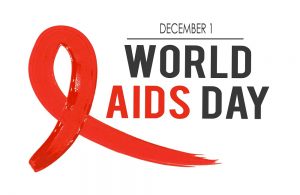On Sunday (1 December), we mark World AIDS Day: an opportunity to come together to support people living with HIV and to commemorate those who have died. It’s also a time to take stock of how we are doing in the fight against AIDS. Dr Peter Keogh, Deputy Associate Dean Research Excellence & Senior Lecturer in Public Health at The Open University discusses further.
Last year, the UK hit its ‘90-90-90 target’. That is 90% of those infected with the virus have their infection diagnosed, 90% of those diagnosed are on HIV treatments and 90% of those on treatments are ‘virally supressed’ – have an undetectable level of the HIV virus in their blood. But, there is still a long way to go for the rest of the world if we are to meet the global aim of UNAIDS to ‘end HIV by 2030’
 Early diagnosis and treatments now generally means that people with HIV can expect a normal life expectancy. Moreover, those on successful treatments cannot pass HIV on to their sexual partners – are non-infectious. Ensuring that the majority of people with HIV are non-infectious is seen as the key to driving down HIV transmissions and eventually eradicating HIV.
Early diagnosis and treatments now generally means that people with HIV can expect a normal life expectancy. Moreover, those on successful treatments cannot pass HIV on to their sexual partners – are non-infectious. Ensuring that the majority of people with HIV are non-infectious is seen as the key to driving down HIV transmissions and eventually eradicating HIV.
But what does ‘ending HIV’ mean?
The Psychosocial HIV Network – a consortium of academics and community organisations – reported on research into the effects of austerity on services for people with HIV. They concluded that despite treatment advances, difficulties associated with living with HIV remain. People living with HIV have higher rates of mental health difficulties and amongst certain groups – migrant and BAME communities and older people – physical and mental health problems, poverty and social isolation are at acute levels. Austerity policies have led to many community support organisations closing with those that remain reporting a 100% increase in people needing food and shelter, having their welfare claims rejected and receiving decreased support with immigration cases.
For some time, people have debated whether HIV has been controlled to the extent that it now like any other chronic condition – like diabetes or cardiovascular disease. In one key sense, we might say that it is. As biomedical treatments improve significantly, a decade of austerity means that our capacity to support those living with the condition has been fatally weakened.
Find out more:
About The Reproduction, Sexualities & Sexual Health Research Group at The Open University
Further information on the National Aids Trust



